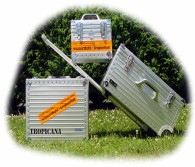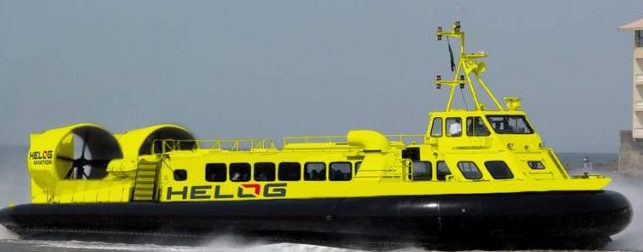Hear The Thunder
Arch Patton arrives in Africa
By J. Strauss
The Internet termed the place to be Lungi International Airport, Sierra Leone, but no description was given, nor would it have served, not even for the seasoned African traveler. Those of life experience chose to avoid such places. There was nothing to be observed that wanted of memory and certainly nothing to be gained in the way of compensation for time or labor.
A single KLM airliner sat on the tarmac. It had rolled up from taxi only moments earlier. Concrete, repeatedly cracked and tar repaired, thrust heat upward so quickly that the plane appeared to sit there like a desert mirage, shimmering in the distance. From above, the whole airport resembled an unmoving spider with a single aluminum morsel pinned down by the very tip of one leg.
 The forward door of the plane swung upward very slowly as if cranked by a heat-weakened slave. The curved surface swung out from top-mounted hinges, while a set of multiple telescoped stairs unfolded to touch the concrete below. The door stopped at the same instant as the bottom step hit the ground. A white cloud began to form over the opening. The plane’s cabin flowed seventy-five-degree dry air out into the hot humid mess of Sierra Leone’s atmosphere as if waving a rising flag of surrender.
The forward door of the plane swung upward very slowly as if cranked by a heat-weakened slave. The curved surface swung out from top-mounted hinges, while a set of multiple telescoped stairs unfolded to touch the concrete below. The door stopped at the same instant as the bottom step hit the ground. A white cloud began to form over the opening. The plane’s cabin flowed seventy-five-degree dry air out into the hot humid mess of Sierra Leone’s atmosphere as if waving a rising flag of surrender.
The Dutch airline company had reluctantly contracted to provide service to the capital’s airport but that same contract stipulated no crew members were to leave the aircraft, even to stand at the top of the opened stairs. In spite of civil disturbance and strife in countries around the world, Sierra Leone was alone in being afforded some measure of civilian service albeit in a very quarantined way.
Two passengers exited through the white cloud and descended to the hot tarmac. Arch was the first of them. He stood and waited for the second man, although the man was a stranger to him. He grimaced down at the palm of his right hand. His hand had gripped and slid down the aluminum stair railing with unnecessary intent. The blackened skin from the tight contact would not be wiped away without some solvent. He ran the back of the hand over his sweating brow. The heat welling up from the concrete poured over him in waves, feeling like a series of invisible cobwebs he wanted to brush away but couldn’t. He put his hand down and waited, noting how his cotton clothing was already beginning to soak through.
 The German finally made it down to stand next to him, his exit from the aircraft hampered by three Rimowa camera cases, each with “Tropicana,” etched into the sides. Aboard the aircraft Arch had seen him, taken him to be a photographer by his vest, but not encountered him. Until he deplaned Arch was unsure whether anyone would be getting off with him. Conakry in Guinea was the plane’s next destination, which according to Arch’s seatmate was ‘civilized’ compared to Sierra Leone.
The German finally made it down to stand next to him, his exit from the aircraft hampered by three Rimowa camera cases, each with “Tropicana,” etched into the sides. Aboard the aircraft Arch had seen him, taken him to be a photographer by his vest, but not encountered him. Until he deplaned Arch was unsure whether anyone would be getting off with him. Conakry in Guinea was the plane’s next destination, which according to Arch’s seatmate was ‘civilized’ compared to Sierra Leone.
A sigh of relief came up out of his lungs as Arch watched an ancient looking Land Rover approach through the shimmering waves of rising heat. He would not have to walk to the terminal, which seemed impossibly distant. The KLM’s engines began to spool up behind him. They’d never been shut down, as if the pilots knew they might have to leave with only second’s notice. Arch turned his head and spotted two bags on the concrete, although he hadn’t seen or heard anyone else get off the plane to unload them.
“We go,” the German said, in German. When Arch didn’t respond he motioned with one of his expensive looking Tropicana boxes. Their eyes met. Arch saw no hostile intent, only the quite normal urgency of a German wanting to get and keep moving. When German’s stopped moving, Arch had learned long back, they were either totally drunk, asleep or dead.
“The vehicle is for the bags, not us. We must walk. It is a rule here. Take one of my cases.” The German held out one of the Tropicana cases, as if it was quite natural for strangers to carry other stranger’s bags.
Arch had his own small leather bag. He’d determined to speak only English while in Sierra Leone. The German was attempting to tax him physically and also to throw him out of his attempt to stay in his planned role. Acting befuddled by the man’s language didn’t help with the bag issue however. The German merely sat one Tropicana by Arch’s right leg and walked off in the direction of the distant terminal, assuming Arch would figure it all out and follow.
“Shit,” Arch whispered under his breath. The day was not going well. The Land Rover blasted by, swerving around, with a deeply black African hanging out the driver’s window laughing and waving his hat. “Very funny,” Arch said to no one around, picking up and carrying the German’s bag.
“Sprechen Sie English?” Arch asked hopefully, once he caught up to the smaller fast-moving man.
“Sprechen Sie Deutsch?” the man shot back, his eyes fastened only on the terminal ahead.
“Nein,” Arch responded, automatically, “Ich spreche nichts Deutsch.”
The German looked over at Arch, a frown forming on his brow. “And I don’t speak a word of English.” The man laughed but didn’t elaborate.
Arch didn’t know what to say. The man had not only spoken in English he’d done it without much of an accent, as only a person who spoke English fluently might do.
“Verstehen?” the German laughed.
Arch took a moment to think before answering. The man was now toying with him. Arch had let the heat and strangeness of the situation get to him. He’d told the man he didn’t speak German the same way the man had replied to him in English. The day was indeed, not going well.
“Okay,” Arch confessed. “I speak a little German. Ich spreche ein bissen Deutsch.”
“I don’t really give a damn,” the German replied, “and you speak considerably more than a little German. Your intelligence of some sort or other but I don’t care about that either. You’re carrying my bag for me so I’m talking to you.”
“How generous,” Arch responded, wondering even more about the German.
“You a photographer?” Arch asked.
“No kidding, what was your first clue?” the man answered.
Arch didn’t respond. The man was impossible, the heat unbearable, and the terminal not seeming to get much closer. His clothes were soaked through by the time they reached the old cream-colored building. It had been white once, Arch realized, but time and the awful conditions of wind, moisture and water had taken their toll.
Double doors opened before them, their automatic mechanism being two African males instead of radar and motors. The men smiled. Arch couldn’t help but smile back. The German simply turned to Arch and held out one hand for his bag. Arch handed it over.
“Thanks,” he said to the German’s departing back, as the man disappeared into a huge throng of local people all yelling and waving stuff in the air. Arch followed, thankful to be out of the scorching heat. The inside of the building was air-conditioned although the temperature was certainly not less than eighty. But it was dry. Arch’s clothing became almost icy to the touch as rapid evaporation set in. He closed his eyes in for a brief instant of relief but opened them quickly, reacting to a hand pushing against his chest.
A short native stood in front of him, penetrating the five-foot circle the other clamoring locals had formed. “I am your servant and guide,” the man said, cupping his hands to be heard over the din. Then he smiled, revealing a mouth with every other tooth missing, as if some whacked out dentist had formed the even arrangement on purpose.
Arch tried to push the man aside but he held up one hand. In the hand was a very official looking identity badge with a photo on it. The thing was attached to a long chain strung around the man’s neck.
“I will handle your bags first,” the man said as he slipped the chain over Arch’s head.
“You take and keep. I get the bag and put aboard hovercraft. One U.S. dollar is all I charge. You pay me when we get to Freetown. I am a reasonable man. And honest. See it is a good photo of me on the card.”
Arch groaned. His head was splitting with the beginnings of a sinus headache. He felt like his weakening body could easily be spread across the surface of a huge pizza tin.
“Okay,” Arch replied, his ticket receipt with baggage claim tag already torn from his hand. “What hovercraft?” he tried to ask the man, but he was gone, disappearing instantly into the crowd with Arch’s bag.
Most of Africa was insane, in its own way and Lungi Airport was no different. The entrance to the country involved about ten seconds of paper checking and half an hour to clear metal detectors set in place to check incoming passengers. Arch had never been in an airport that checked incoming passengers for weapons. The German had made it into line, carrying his super expensive Rimowa bags. Arch waited in the heat, wondering why the man hadn’t given his luggage over to a steward like he had. The German popped his bags onto the moving belt and they disappeared one after another into the noisy scraping maw of the machine.
“Wait,” the German yelled, “My passport,” he blurted out. The luggage-eating machine ground to a halt. The single attendant moved to the line and asked the German what he was talking about. The German told him that he’d dropped his passport on the moving belt and it had gone into the machine. The German’s English was confirmed to Arch, standing just behind him. The German demanded to see a manager when talking to the attendant went nowhere. A tall elegant African man came out of a nearby office. He was wearing an immaculately white military uniform and carrying a short black swagger stick up under his right arm.
“What seems to be the difficulty?” he asked of the German, as he stepped next to the machine’s attendant. His swagger stick came out from under his arm and tapped the conveyor belt with a snap. All conversation in the crowded area ceased.
“Ah,” the German began, his demeanor changing rapidly from demanding to beg. “My passport went down between the belts on this machine.”
“And what is it that you expect to happen because of this,” the lieutenant asked, his swagger stick tip rising and doing a slow figure eight in front of the German’s red face.
“This machine needs to be disassembled and my passport was taken out of it,” the German managed to get out, more as a question than a request.
“I see,” the lieutenant said, instantly whipping around and walking back to his office. He gave the German a last look before he disappeared inside. Nobody moved in the transit area. The lieutenant returned after a few long moments. He walked back to the silent machine and stopped.
“I have the solution,” he intoned softly, his swagger stick tucked once more firmly up under his arm, with the other behind his back.
“You have?” the German asked, in disbelief.
The lieutenant smiled and then brought his arm out from where it had been hidden. A screwdriver lay atop his opened hand.
Arch had everything he could do to keep from laughing. The noise of the crowd returned. The lieutenant retreated back to his office and the attendant waived everyone in line around the shutdown machine.
A huge black hovercraft sat on flat ground in front of the airline terminal. Arch walked over to a Caucasian man dressed in uniform standing by its side.
“Twenty-five bucks, U.S.,” the man said, holding out one hand.
Arch shrugged, hauling out some cash from his right front pocket.
“Any luggage?” the man asked.
Arch waved the I.D. tag attached to the chain around his neck toward him.
The man laughed but waved him aboard. Arch seated himself behind what appeared to be an elderly English couple on the far side of the conveyance.
The uniformed man stuck his head in the hatch. “The air conditioner will start with the engines. We have only one passenger left to pick up.”
The wait seemed interminable. After at least fifteen minutes the last passenger climbed through the hatch, which was quickly swung and dogged shut by the crewman. It was the German. The man went directly for Arch and took the seat right next to him. Arch noted the man’s fingers were black with rubbed off grease.
The engines started and air conditioning blew from overhead vents. Arch felt himself coming back to life under the wind-driven coolness coming down.
Arch noted the I.D. tag dangling from the German’s neck.
“You get your passport back?” he could not help asking the man.
“Yes, and I gave my luggage to the same idiot you did. I would have saved myself a lot of trouble if I’d done that sooner.”
Arch smiled to him and then turned to look out the window, as the big machine moved out form under a dust cloud to flow over the heavy brush leading across the bay toward Freetown. Travel in the undeveloped areas of Western Africa was challenging at best, but life experience had taught Arch a long time back to keep his passport on the inside of his right sock. Life experience counted for something. The German had been lucky to ever see his passport again.
Mid-way through the half-hour flight, the English couple in front of them began to argue.
“You shouldn’t have paid that guy fifty dollars to take you around the line. They started passing everyone by for nothing only a few minutes later,” the angry older man said, crossing his arms as if to pout.
“That may be true, but at least we didn’t fall for that phony I.D. tag on the chain routine that cost us our luggage in Guinea last year,” the woman answered, after a moment.
Arch turned his head to look at the German. Both men fingered the I.D. tags they had hanging on chains around their necks.
















Don't Miss any Updates or New Chapters
Join our mailing list to receive the latest news and updates from our team. You can easily Opt-Out anytime
You have Successfully Subscribed!